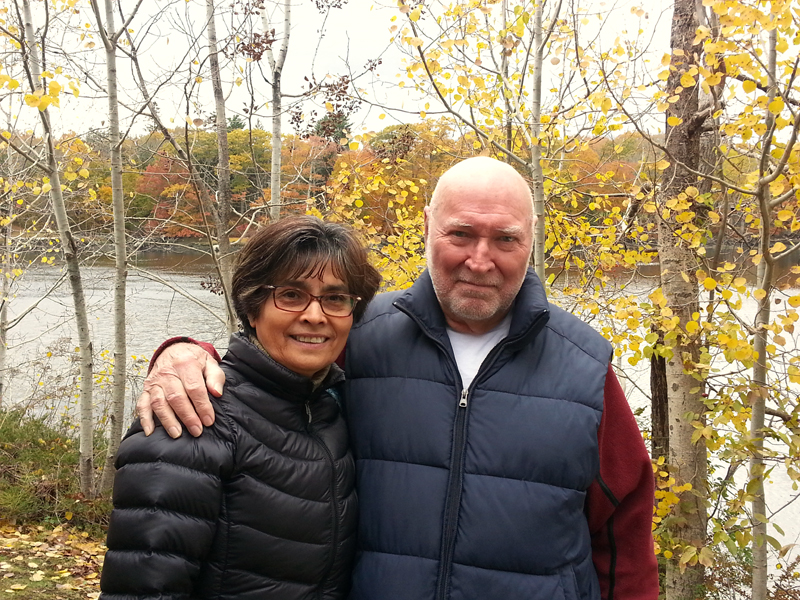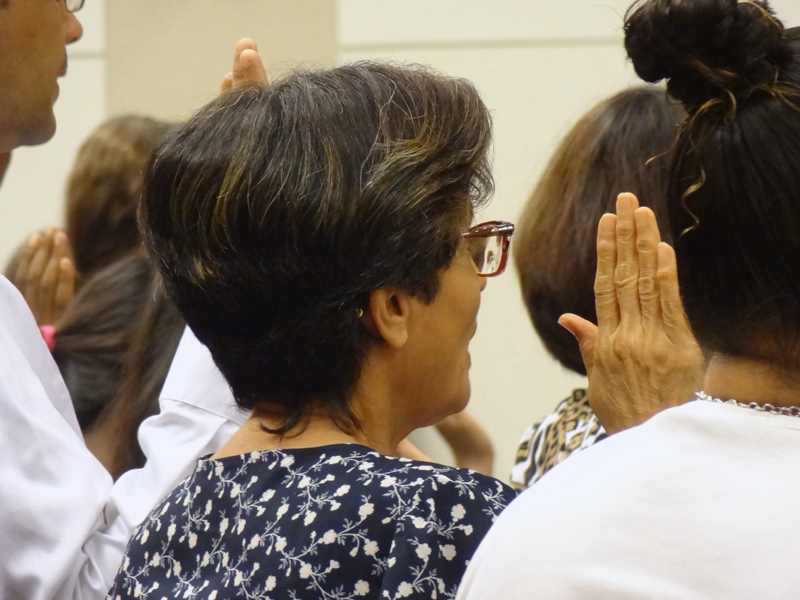
Natalia Jackson with her husband, Keith Jackson. A native of Panama, Natalia Jackson moved to South Bristol in 2015 and became a U.S. citizen in September. (Jessica Clifford photo)
Natalia “Natty” Jackson, 62, of South Bristol and formerly of Panama, recently voted in her first U.S. election since becoming a citizen in September.
Natty moved to South Bristol from Taboga Island, Panama, in September 2015 with her husband, Keith Jackson, 82.
She grew up on the mainland in a town just outside the east coast city of Colon, once known for its safety and now known for its corruption and poverty.
As a child, she and her brother and five sisters lived and worked on a farm, growing plantains, coffee, mangoes, sugar cane, and more.
Natty has three sons from a previous marriage. She raised her sons mostly by herself and worked to support them through college.
While still on mainland Panama, she and a friend owned Nuevo San Juan, a restaurant serving breakfast, lunch, and dinner, for six years.
She married Keith, who is fluent in Spanish, six years ago.
Keith is originally from Seattle. He met Natty about 15 years ago when a company she was working for was renting out space in a building he owned in Panama. He lived in Panama for about 13 years before moving back to the U.S. with Natty.
“It took a while to actually propose because I’m so much older, because I felt uncomfortable with that, and she said, ‘No matter, as long as you promise me 20 years,’” Keith said.
In 2014, Keith traveled to New York to see his son graduate from Cornell University with his ex-wife. Afterward, they visited Midcoast Maine.

Sally Tukey (left) and Natalia Jackson at Jackson’s citizenship ceremony in Portland on Constitution Day, Sept. 17. Tukey, who speaks neither Spanish nor Chinese, taught English to Jackson and a Chinese-speaking student. (Photo courtesy Ellen Dickens)
“In South Bristol we just came across this house. I just had a really strong impulse to buy it, even though almost the last thing Natty said to me as I left Panama was, ‘Now, don’t buy a house,’” he said. “And I kind of forgot that.”
Keith visited the house again in 2014, this time with Natty. They moved to the U.S. and renovated the house “into a comfortable, modest country cottage,” Keith said.
Soon after moving to South Bristol, Natty and her husband drove past Osier’s Seafood. She asked him to stop so she could ask for a job.
She wanted a job so she could work on her English, because she knew very little when they moved.
She worked at Osier’s Seafood, doing everything from serving to cooking, for about a year and half. Her English improved.
In addition to learning on the job, she began to take classes through Central Lincoln County Adult Education.
Sally Tukey, a former elementary school educator and GED program instructor, tutored Natty and a student of Chinese descent.
Tukey, who speaks neither Spanish nor Chinese, held night classes with her pupils twice a week for two years at Great Salt Bay Community School in Damariscotta.
“It was the most fun I ever had teaching,” Tukey said. “It was just wonderful. They were both great students that worked so hard.”
Natty continues to work on her vocabulary, pronunciation, and translation.
“I study English every day because I want to understand all,” she said.
Her limited English caused difficulty with her adjustment to life in the U.S., including with her driver’s test. She failed the test five times because she didn’t understand what she was doing wrong.
Eventually, with the help of a driving instructor, she passed the test and earned her license.
Though Natty continues to need her husband’s assistance with her English, she is getting closer to fluency.
South Bristol has become home for Natty. “I love this place,” she said.

Natalia Jackson takes the naturalization oath during a citizenship ceremony at the University of Southern Maine in Portland on Sept. 17. (Photo courtesy Ellen Dickens)
Living in Maine was a “huge cultural adjustment and (a) very positive one,” Keith said.
Natty appreciates the safety of South Bristol in comparison to Panama.
To leave a bicycle outside or to pay for something with the honor system would be impossible in Panama, she said. Panamanian women hold their purses to their chests while walking in public to protect against theft.
“My first time I went to Hannaford with Keith, he said, ‘Sweetie, this is unnecessary,” Natty said, recalling when she clutched her purse to her chest.
“Now I relax because I am safe,” she said.
Another cultural adjustment was driving in the U.S., because Keith described driving in Panama as a “competition.”
“Natty got (pulled over) one time for rolling through a stop sign,” Tukey said. “She said, ‘Well, you have to do that in Panama, or someone’s going to come up and rear-end you.’”
Natty began the process of becoming a U.S. citizen five years ago, while still in Panama, filling out stacks of paperwork with personal information going back to her grandparents.
Prospective citizens must pass a series of oral and written exams. Natty needed to know the answers to 100 questions for the oral civics exam, though the examiner only asks 10. Test-takers need six correct answers to pass.
At first, she only knew the answers to 13 of the 100 questions. Keith said the test contains questions the average American could not answer.
For three months before the test, Natty studied every day, with her husband asking questions once or twice a day. Tukey helped Natty study once a week at the Skidompha Second Hand Bookshop.
“She worked so hard, she knew every answer before she went,” Tukey said.
However, Natty said she was extremely nervous before the test and interview.

From left: Natalia Jackson with her husband, Keith Jackson, and her son, Marco Adolfo, at the citizenship ceremony in Portland. (Photo courtesy Ellen Dickens)
“(Keith) said ‘Natty, when the examiner asks you a question, breathe in, think, and answer,” Natty said.
She passed with every question correct.
The 40-minute interview felt like two hours, she said. Only Natty, her lawyer, and an examiner were present.
A few days later, Natty registered to vote. As soon as ballots were available about three weeks ago, she and her husband did early voting.
“It was much easier for Natty to do it at home,” Keith said.
Though she used to vote every year in Panama, the midterm election was the first time she was eligible to vote in the U.S.
At the citizenship ceremony in Portland on Sept. 17, guest speakers shared the crucial job a U.S. citizen has to play – being informed.
“They really stressed the responsibilities of citizenship and being informed about local and national issues, and the importance of exercising your right to vote,” said Keith, who attended the ceremony.
In addition to keeping track of local and national news, Natty continues to follow the news in Panama because her family still lives there.
Since leaving Osier’s in 2016, she has been building a cleaning business. She has about a dozen clients, mostly for the summer months, and three she works for year-round.
From her jobs, Natty has become popular with her neighbors.
“I’ve got three or four friends; she has 40 or 50,” Keith said.
Natty’s entrepreneurship and popularity with her clients and neighbors “speaks to the kind of people who want to come to the United States: people with energy, extremely positive,” Keith said.






